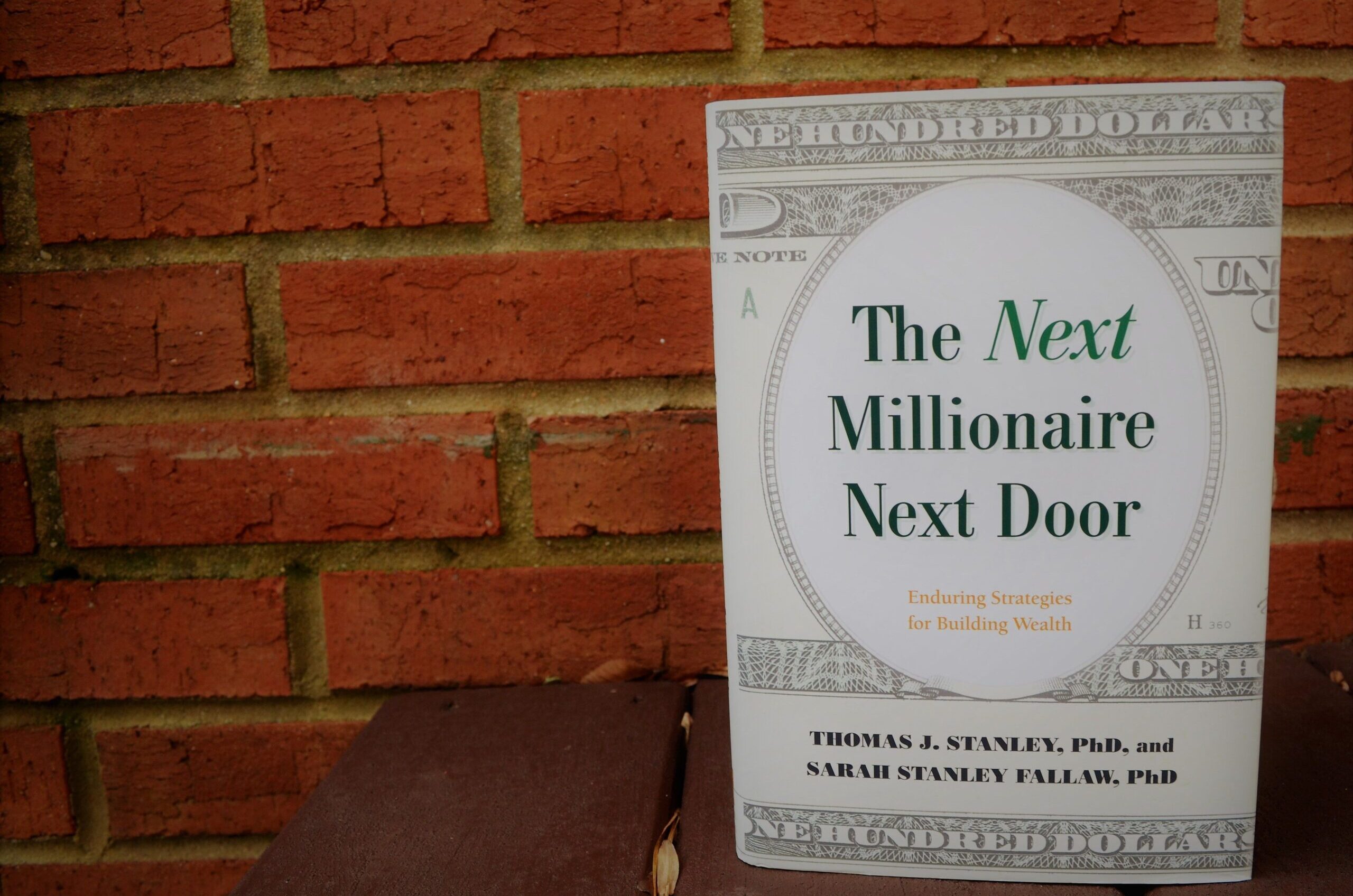Many of us who have no point of reference for how to achieve financial success look to those who we believe are wealthy. If you’re an 80s baby like me, you probably remember the television show “Lifestyles of the Rich and Famous.” Maybe you’re a bit younger and you remember the show “MTV Cribs.” Every person featured on these shows drove nice cars, lived in grand homes, took lavish vacations, and wore the latest fashion trends head-to-toe. When I started my career in financial planning, I had all the technical skills required to help people manage their money. It wasn’t until I started working with clients who were multimillionaires that I saw a different side of being wealthy.
After a few years in the industry, I came across a book that completely changed how I think about money and confirmed the behaviors and habits that I saw in my clients. “The Millionaire Next Door” provided insight into what it truly means to be wealthy. It wasn’t about fancy cars, houses, vacations, and clothes. It was a result of a lifetime of positive habits that are conducive to building and maintaining wealth. While it’s not a cakewalk, building wealth is possible for many of us to achieve.
“The Millionaire Next Door,” written by Dr. Thomas Stanley and Dr. William Danko, was a research-based book that profiled how people became wealthy. Originally written in 1996, its concepts still hold true today. Twenty years after the original book, Stanley and his daughter, Dr. Sara Stanley Fallaw, decided to re-examine the key traits of millionaires next door while also considering what building wealth looks like today. A drunk driver tragically killed Stanley in 2015, so Dr. Fallaw set out to complete her father’s research. She published a follow up to the original, “The Next Millionaire Next Door,” in 2018. After reading both books and working with wealthy clients for over a decade, here are five of the greatest lessons I learned about building and maintaining wealth:
Income Does Not Equal Wealth
You may associate a high income with wealth, but the two terms can be very different. Income is what you bring in. Wealth is what you accumulate. I’ve spoken with so many people who make hundreds of thousands of dollars each year but have little or no assets. The people who appear to be rich are often saddled with debt and living paycheck to paycheck. They continue to increase their spending as their income increases and their lifestyle keeps them from accumulating wealth.
People who are truly wealthy believe that financial independence is more important than displaying high social status. If you want to use your high income to build wealth, commit to a lifestyle in which you live below your means and prioritize saving for your future.
Building Wealth Requires Discipline
If you want to be successful in building wealth, you need to have discipline. Only a small percentage of the population receives a massive windfall. Even if you’re lucky enough to receive an inheritance, win the lottery, or sign a multimillion-dollar contract as an athlete or entertainer, a lack of discipline will quickly lead you down the path of being broke.
The wealthy allocate time, energy and money efficiently, in ways conducive to building wealth. They track their spending and net worth and set goals. They spend time planning their financial future and developing good financial habits. They understand that there is no quick fix when it comes to financial success. Dr. Fallaw says it best in her book:
There’s no one class, special manual, or app that will lead to a lifetime of economic achievement. Instead, it requires a consistent pattern of financial behaviors. If this starts early, the likelihood of ongoing success is greater. (Fallaw 59)
For most of us, building wealth is a marathon, not a sprint. Know where you are, where you want to go, and take consistent actions to reach your goals.
Having a Plan Helps Too
You’ve probably heard that a goal without a plan is just a wish. The millionaire next door doesn’t go about life “winging it” in hopes that they will accumulate wealth. They are intentional. In addition to setting goals, they develop a plan for how to achieve them. Those who want to succeed in the long-term game of building wealth may seek professional advice to help them create and monitor the plan. A study by Russell Investments shows that the value of a financial advisor far exceeds the cost, especially when you factor in behavioral coaching and financial planning. Research conducted in Canada has shown that just a five-year relationship with a financial advisor can help investors accumulate 1.5 times more in savings than investors who “go in it alone.” Over a 15-year period with a financial advisor, investors accumulate 2.73 times more. Many clients at my previous firms were clients for decades, and I saw firsthand how comprehensive financial planning played a role in their growth.
Not all millionaires seek professional advice, but when they do they are willing to pay top dollar for it. Dr. Fallaw explains:
It’s a startling irony that there’s an inverse relationship between the willingness to pay for luxury items and the willingness to buy investment advice. The income-statement affluent spend heavily on cars, boats, and houses and tend to skimp on investment advice. The balance-sheet affluent however skimp on the luxuries and are usually more willing to pay top dollar for good legal and financial advice. (Fallaw 218)
Building wealth requires a well thought out plan, and that plan needs to be monitored and adjusted over time. Recognize when you don’t have the time, knowledge, or energy to manage your finances on your own and seek qualified professional advice.
Our Decision Making is Constantly Influenced by Others
These days, social media plays a large role in our lives. We see what our friends are doing at every moment – including how they spend their money. Because social media platforms are free to use, we’re the product. Companies create targeted advertisements based on the unlimited data they collect from us. The addition of online shopping has made it much easier to make a purchase with a single click. No need to leave your house! You’ve heard the term “keeping up with the Joneses.” With social media, the Joneses are not just your neighbors. Dr. Fallaw notes how these trends have changed since the original “Millionaire Next Door” was published:
Today we carry the influence of others around with us in our pockets and pocketbooks and spend, on average, two hours on social media per day. Imagine if these two hours were spent developing a new skill, researching a new business idea, or engaging directly with friends, coworkers, and employees… What our friends are buying, wearing, and displaying can impact us psychologically through the desire to conform. The more time we spend on social media, the more marketing of products, services, or experiences will affect our buying habits. (Fallaw 85)
If you seek long-term financial success, you must recognize the influences others may have on your financial attitudes and behaviors. When you’re not affected by what others are buying, you have a better opportunity to build wealth.
Strong Relationships Matter
Many millionaires are intentional about building solid personal, professional, and community relationships. An overwhelming majority of millionaires surveyed for both books were married or remarried and cited their spouses as critical to their financial success. While stable, long-term marriages are not a predictor of wealth, they’re more common for millionaires. “Financially successful couples tend to work together on their finances and generally agree about goals and methods for reaching those goals,” says Dr. Fallaw.
Good professional relationships fuel a strong career. Millionaires not only focus on the continuous improvement of their professional knowledge and skills. They cultivate professional connections that can help them advance their career or transition to self-employment. They’re also active in their communities and seek to build strong community ties.
Before you walk down the aisle, have important money conversations with your partner. Seek strong personal and professional relationships. Always look to improve and keep your options open. As Dr. Fallaw recommends:
Obtain and save not only income from your employer, but the skills, opportunities, and experiences that will allow you flexibility and resources in the future. It’s still the case that transportable skills and experiences set up a good defense against job elimination, economic woes, and even geopolitical upheavals. (Fallaw 176)
Do You Have What it Takes?
In addition to publishing “The Next Millionaire Next Door,” Dr. Fallaw also founded a company called DataPoints. Fueled by the research from both books, DataPoints provides a series of behavioral assessments and tools that help individuals build and sustain wealth. I started using several assessments with my clients to determine their strengths and weaknesses when it comes to wealth-building habits. With the information, I can help clients improve and increase their potential to build wealth.
Want to see if your financial behaviors are conducive to building wealth? Take this shorter version of the assessment I give my clients. My clients often find the results eye-opening, and couples enjoy comparing their results. The wonderful thing about behaviors and habits is that you can always change them for the better. This assessment is a way to see where you are now and how you can improve. I work with clients on the specific tasks required to change the way they think about money and build wealth.
Interested in learning how to increase your potential for building and maintaining wealth? Schedule a consultation!
Did you enjoy reading this post? Want financial inspiration, education, and updates delivered straight to your inbox? Sign up for our newsletter!
Disclaimer: This article is provided for general information and illustration purposes only. Nothing contained in the material constitutes tax advice, a recommendation for purchase or sale of any security, or investment advisory services. I encourage you to consult a financial planner, accountant, and/or legal counsel for advice specific to your situation. Reproduction of this material is prohibited without written permission from Chloe Moore, and all rights are reserved. Read the full disclaimer here.



One comment
Pingback: ampicillin resistance gene encodes
Comments are closed.